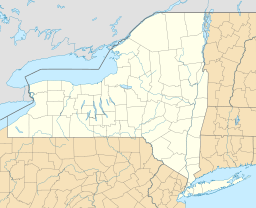Tomhannock Reservoir facts for kids
Quick facts for kids Tomhannock Reservoir |
|
|---|---|
| Location | New York |
| Coordinates | 42°50′43″N 73°32′45″W / 42.84528°N 73.54583°W |
| Type | reservoir |
| Max. length | 5.5 miles (8.9 km) |
| Water volume | 12.3 billion US gallons (47,000,000 m3) |
The water source for the city of Troy, New York is the Tomhannock Reservoir, a man-made reservoir 6.5 miles (10.5 km) northeast of Troy in the town of Pittstown. The reservoir is 5.5 miles (8.9 km) long, and holds 12.3 billion US gallons (47,000,000 m3) when full. Water quality is good to excellent. Licensed fishing (both warm-weather and ice fishing) is a popular recreational activity.
History
Construction of the reservoir began in 1900 as a successor to the Oakwood, Brunswick and Lansingburgh Reservoirs, and it was placed into service in 1906. After eight years of repairs to the original 33 inches (84 cm) main, a supplemental 30 inches (76 cm) main was installed to stabilize the city's water supply. Facilities for chlorination, metering and the addition of lime to the water were added in 1952. In 1960, a study determined that the Tomhannock Reservoir could serve the city of Troy and the region immediately adjacent to the city (East Greenbush, North Greenbush, Brunswick, a portion of Schaghticoke, and West Sand Lake) in southern Rensselaer County. During the early 1960s a treatment plant was constructed, which provided filtration and additional supplementation with alum, carbon, potassium permanganate and fluoride.



